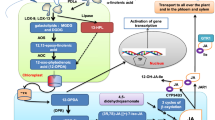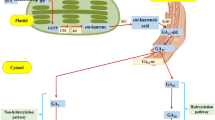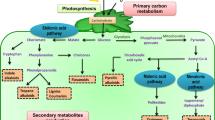Abstract
The role of systemin inPin2 gene expression was analyzed in wild-type plants of potato (Solanum tuberosum L.) and tomato (Lycopersicon esculentum Mill.), as well as in abscisic acid (ABA)-deficient tomato (sitiens) and potato (droopy) plants. The results showed that systemin initiates Pin2 mRNA accumulation only in wildtype tomato and potato plants. As in the situation after mechanical wounding,Pin2 gene expression in ABA-deficient plants was not activated by systemin. Increased endogenous levels of jasmonic acid (JA) and accumulation of Pin2 mRNA were observed following treatment with α-linolenic acid, the precursor of JA biosynthesis, suggesting that these ABA mutants still have the capability to synthesize de novo JA. Measurement of endogenous levels of ABA and JA showed that systemin leads to an increase of both phytohormones (ABA and JA) only in wild-type but not in ABA-deficient plants.
Similar content being viewed by others
Abbreviations
- ABA:
-
(±)cis,trans-abscisic acid
- JA:
-
jasmonic acid
- Pin2:
-
proteinase inhibitor II
References
Abian J, Gelpi E, Pages M (1991) Effect of abscisic acid on the linolenic acid metabolism in developing maize embryos. Plant Physiol 95: 1277–1283
Amasino RM (1986) Acceleration of nucleic acid hybridization rate by polyethyleneglycol. Anal Biochem 152: 304–307
Farmer EE, Ryan CA (1990) Interplant communication: Airborne methyl jasmonate induces synthesis of proteinase inhibitors in plant leaves. Proc Natl Acad Sci USA 87: 7713–7716
Farmer EE, Ryan CA (1992) Octadecanoid precursors of jasmonic acid activate the synthesis of wound-inducible proteinase inhibitors. Plant Cell 4: 129–134
Farmer EE, Johnson RR, Ryan CA (1992) Regulation of expression of proteinase inhibitor genes by methyl jasmonate and jasmonic acid. Plant Physiol 98: 995–1002
Hildmann T, Ebneth M, Peña-Cortés H, Sanchez-Serrano J, Willmitzer L, Prat S (1992) General roles of abscisic and jasmonic acid in gene activation as a result of mechanical wounding. Plant Cell 4: 1157–1170
Kernan A, Thornburg RW (1989) Auxin levels regulate the expression of a wound-inducible proteinase inhibitor II-chloramphenicol acetyl transferase gene fusion in-vitro and in-vivo. Plant Physiol 91: 73–78
Knöfel HD, Brückner C, Kramell R, Sembdner G, Schreiber K (1990) Radioimmunoassay for the natural plant growth regulator (-)-jasmonic acid. Biochem Physiol Pflanzen 186: 387–394
Lightner J, Pearce G, Ryan CA, Browse J (1993) Isolation of signaling mutants of tomato (Lycopersicon esculentum) Mol Gen Genet 241: 595–601
Logemann J, Schell J, Willmitzer L (1987) Improved method for the isolation of RNA from plant tissue. Anal Biochem 163: 16–20
Melan MA, Dong X, Endra ME, Davis KR, Ausubel FM, Peterman TK (1993) AnArabidopsis thaliana lipoxygenase gene can be induced by pathogens, abscisic acid, and methyl jasmonate. Plant Physiol 101: 441–451
Pearce G, Strydom D, Johnson S, Ryan CA (1991) A polypeptide from tomato leaves induces the synthesis of wound-inducible proteinase inhibitor proteins. Science 253: 895–898
Peña-Cortés H, Willmitzer L (1995) Role of hormones in the gene activation in response to wounding. In Davies PJ (ed) Plant hormones: Physiology, biochemistry and molecular biology. Kluwer Academic Publishers, Dordrecht, The Netherlands, pp 395–414
Peña-Cortés H, Sanchez-Serrano J, Rocha-Sosa M, Willmitzer L (1988) Systemic induction of proteinase inhibitor II gene expression in potato plants by wounding. Planta 174: 84–89
Peña-Cortés H, Sanchez-Serrano J, Mertens R, Willmitzer L, Prat S (1989) Abscisic acid is involved in the wound-induced expression of the proteinase inhibitor II gene in potato and tomato. Proc Natl Acad Sci USA 86: 9851–9855
Peña-Cortés H, Willmitzer L, Sanchez-Serrano J (1991) Abscisic acid mediates wound induction but not developmental-specific expression of the proteinase inhibitor II gene family. Plant Cell 3: 963–972
Peña-Cortés H, Liu X, Sanchez-Serrano J, Schmid R, Willmitzer L (1992) Factors affecting gene expression of palatin and proteinase inhibitor II gene families in detached potato leaves: Implications for their co-expression in developing tubers. Planta 186: 495–502
Peña-Cortés H, Albrecht T, Prat S, Weiler EW, Willmitzer L (1993) Aspirin prevents wound-induced gene expression in tomato leaves by blocking jasmonic acid biosynthesis. Planta 191: 123–128
Quarrie SA (1982) Droopy: a wilty mutant of potato deficient in abscisic acid. Plant Cell Environ 5: 23–26
Sanchez-Serrano J, Schmidt R, Schell J, Willmitzer L (1986) Nucleotide sequence of proteinase inhibitor II encoding cDNA of potato (Solanum tuberosum) and its mode of expression. Mol Gen Genet 203: 15–20
Taylor IB, Linforth RST, Al-Naieb RJ, Bowman WR Marples BA (1988) The wilty tomato mutantsflacca andsitiens are impaired in the oxidation of ABA-aldehyde to ABA. Plant Cell Environ 11:739–745
Thornburg RW, Li X (1991) WoundingNicotiana tabacum leaves causes a decline in endogenous indole 3-acetic acid. Plant Physiol 96: 802–805
Wildon DC, Thain JF, Minchin PEH, Gubb IR, Reilly AJ, Skipper YD, Doherty HM, O'Donnell' PJ, Bowles DJ (1992) Electrical signalling and systemic proteinase inhibitor induction in the wounded plant. Nature 360: 62–65
Author information
Authors and Affiliations
Corresponding author
Additional information
We are specially indebted to Dr. C.A. Ryan (Institute of Biological Chemistry, Washington State University, Pullman, USA) for generously supplying us with the peptide systemin and for helpful comments on the manuscript. We are grateful to Dr. R. Trethewey and N. Provart (Institut für Genbiologische Forschung, Berlin, Germany) for critically reading the manuscript. We also wish to thank Regina Breitfeld for taking care of the greenhouse plants and Antja Voigt for the photographic work.
Rights and permissions
About this article
Cite this article
Peña-Cortés, H., Prat, S., Atzorn, R. et al. Abscisic acid-deficient plants do not accumulate proteinase inhibitor II following systemin treatment. Planta 198, 447–451 (1996). https://doi.org/10.1007/BF00620062
Received:
Accepted:
Issue Date:
DOI: https://doi.org/10.1007/BF00620062




